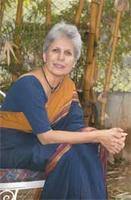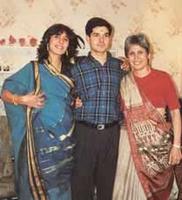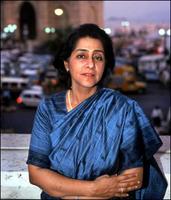
Mrs. Anu Aga - Former Chair person of Pune based Thermax India,an engineering company.
Aga is always in her trademark cotton or silk saris, whether it's for a talk on women achievers at a convention organised by the Indian Institute of Management (Kolkata), for the pages of the November issue in Business Today as
part of the top 25 most powerful women in business, or while accepting the
lifetime achievement award at the Financial Express-Electrolux Women in Business Awards, as she did last year(2004). Just like the sari, the no-nonsense expression on her face, reflecting steely determination, is an intrinsic part of her.
This calm determination has helped her family and company Thermax India tide over trying times. The death of her husband Rohinton in 1996 from a heart attack thrust her into the chairperson's role of Thermax, an engineering company that was begun by her father A S Bathena three decades ago and later managed by Rohinton. Just as Aga, till then director of human resources, was finding her feet as the head of Thermax, she suffered another deep loss-the death of her 25-year-old son Kurush in a road accident.

At the time, Thermax's growth curve dipped and share prices plummeted from Rs 400 to Rs 36. An anonymous letter from a shareholder accusing her of letting him down forced her to take stock of the situation. "I realised I wasn't capable but was only pretending to run the business," she says. Losing no time, she detached herself from day-to-day operations and brought in a foreign consultant to restructure the company-the move revived its fortunes.
Since its turnaround, Thermax, with its presence in 14 countries, has emerged as a leading manufacturer of engineering products and systems for industries. "Despite stiff challenges at work and crises at home, she succeeded in separating her ownership and professional responsibilities, so crucial in the leadership of a closely held family enterprise," recalls P M Kumar, former head of human resources, under whom Aga had trained in the 1980s.
With the company firmly back on track, Aga felt the need to focus on other interests. "I know many people who have held on to their posts, with the company waiting for them to step down," she says. "I didn't want that for myself." In October last year(2004), after 19 years with Thermax, Aga handed over the charge to daughter Meher Pudumjee. "She was hesitant and felt I could have carried on," says Aga. "But I told her this was her moment. If she was not keen, I would find another chairperson."
A staunch believer in succession planning, Aga wanted to guide her daughter while she could. "I don't want her to take over when I die," she wrote in her column "Reaching Out" in Fireside, the Thermax newsletter. Her confidence in Pudumjee wasn't misplaced. Pudumjee was named one of India's top 30 achievers in April 2005 by India Today. "She has an uncanny business sense," says Pudumjee. "Sometimes what works for me as a chemical engineer may not actually work; she has the means to point that out."

Meanwhile, six months into her retirement, Aga's light brown diary of engagements is still full. In it, she diligently marks her appointments-
as trustee in charitable organisation Akanksha Foundation, as board member in Mumbai-based Women's India Trust and Commonwealth Human Rights Initiative in Delhi, a director at Thermax, and one of the directors at weekly newspaper Tehelka. "She is a rare breed, an elite Indian who is unafraid to speak out and take up cudgels for the public's interest," says Tarun Tejpal, CEO of Tehelka. The admiration is mutual. "There is a price to pay for being silent in a democracy," declares Aga, her brow creased faintly. "Tehelka is brave for fighting corruption and standing its ground in the face of odds."
Aga was one of the few people who signed a cheque for Tehelka when its website was fighting a legal battle against the government over the exposé of high-level corruption in the defence ministry in 2001. Later, Tejpal heard Aga give a series of talks against the communal riots in Gujarat in 2002. Her uncensored outrage spurred him to invite her as a director when he started the newspaper in 2003. After the riots, hers was one of the few voices that spoke out against the establishment without worrying about the consequences to her company or family. "Nothing suffered, and I am glad I spoke out," she says.
Aga has other passions. A
social worker by training-she did her Masters in Social Work from the Tata Institute of Social Sciences, Mumbai-Aga spends lots of time discussing projects with Akanksha, an organisation that educates poor children in Mumbai and Pune. She was instrumental in the opening of its Pune branch, six years ago. Aga funded and gave the organisation free space in Thermax's premises. In July, she will train welfare workers for 10 municipal schools in Pune.
Aga's son Kurush, who urged her to spend more time and money on social causes, boosted her sense of social responsibility. "I feel the real purpose of business is human well being," says Aga, who claims she is hopeless with numbers but more interested in human capital, recognising it as the most important stakeholder in a corporate set-up.
Since 2003, Thermax has put aside 1 per cent of its annual profits for the social sector. 
Even as Aga's commitment to society takes up most of her energy, her time with grandchildren Zahaan, 9, and Lea, 6, is non-negotiable. "I was a 'hi and bye' granny. But now I am going to change all that," she announces. Aga has just spent the summer with them at a rented apartment in Vancouver, Canada. "On some days, we did the waking-up-late and breakfast-in-bed routine."
At home in Pune, Aga prefers the 'early to bed and early to rise' routine. Her day starts with exercise, usually a mix of cycling, yoga and walking. She doesn't watch too much TV, preferring to catch up with the news through papers. She also likes to watch movies at the local cinema hall. "I admire Aamir Khan for his commitment to role playing and the dignified manner in which he handles his personal life," she says. Sometimes she watches films on the home theatre at her daughter's house. A sociable person, she likes loosening up at parties by dancing a bit. "And my favourite water sport is snorkelling," she reveals. "It is a whole new world under the sea."
Being open to challenges and taking them on confidently is second nature to Aga. "Full of dynamism, she is unafraid to take tough decisions when needed," says Lalita Gupte, joint managing director, ICICI Bank, who worked closely with Aga on various committees of the Confederation of Indian Industry. "I reckon the events in my life have taken the fear out of me and made me bold," says Aga. Earlier, she would touch wood whenever anything unpleasant was said. "Now even a log of wood can't change my destiny," she shrugs.
It is a lesson she has learnt well. After her husband passed away, Aga read up extensively on death. Though reading gave her understanding, attending courses in Vipassana-a Buddhist meditation technique-near Nashik helped her accept death. "Even now, an hour of meditation every day gives me strength," she says.

On a television interview telecast in May, Aga compared life and death to the rising and setting of the sun. "When the sun sets, it is accepted as a natural process," she said. "Similarly death is not a tragedy; when one has to go, one will go. I don't want to sound like a saint, but at least I am aware that I am on this earth for a short time." She plans to make good use of every moment.
















